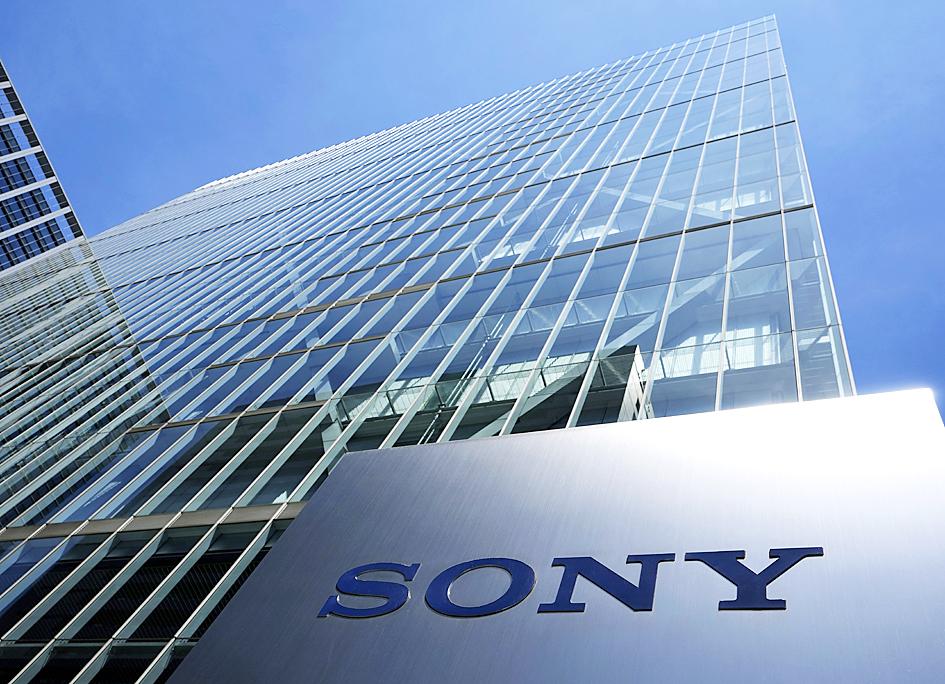Sony Group Corp yesterday reported its best-ever sales in the financial year to March thanks to strong results in movies, electronics and music, although net profit dipped 14 percent from the previous year’s record.
A gaming boom amid COVID-19 lockdowns has slowed, but the Japanese giant has seen success in other entertainment sectors, with Spider-Man: No Way Home overtaking Avatar as North America’s third-highest-grossing film.
Demand for sensors used in smartphone cameras has continued to soar, and Sony Music also scored a winner with Adele’s latest album 30 and strong licence revenue in its popular anime business.

Photo: Kimimasa Mayama, EPA-EFE
It reported full-year sales for 2021-2022 of ¥9.9 trillion (US$76 billion) and net profit of ¥882 billion.
In 2020-2021, Sony logged a record net profit of more than ¥1 trillion, partly thanks to tax gains and the explosion in popularity of video games during lockdowns.
The 10 percent increase in sales from ¥8.99 trillion in 2020-2021 “was mainly due to significant increases in sales in the pictures, electronics products and solutions and music segments,” Sony said.
Hideki Yasuda, senior analyst at Toyo Securities Co, said that Sony would likely benefit from the fall of the yen, which has hit 20-year lows against the US dollar this year.
The conglomerate is now succeeding in a broader range of sectors with favorable business environments, such as music and movies, Yasuda said.
“Sony is really turning into a content company now, from its previous status as an electronics manufacturer,” he said.
For the current financial year to March next year, Sony predicted that sales would rise 15 percent to ¥11.4 trillion, while net profit is projected to slip 6 percent to ¥830 billion.
Sony has faced challenges rolling out its PlayStation 5 (PS5) console, which remains difficult to get hold of 18 months after its launch in November last year — in part due to supply chain disruption, including a global chip shortage.
The company “could have sold so many more PS5s if they were able to produce more,” said Serkan Toto, an analyst at Kantan Games Inc in Tokyo.
“I don’t see any kind of problem for Sony in the gaming world or in the gaming market, except for the supply chain issues,” Toto said. “It’s impossible to get a PlayStation 5. It’s ridiculous.”
Separately, Nintendo Co issued a cautious forecast for the current financial year as it reported a solid 2021-2022 net profit of ¥477.7 billion, down 0.6 percent year-on-year.
The gaming giant, which has benefited from a string of popular titles including the January release of Pokemon Legends: Arceus, expects net profit for 2022-2023 of ¥340 billion.

In Italy’s storied gold-making hubs, jewelers are reworking their designs to trim gold content as they race to blunt the effect of record prices and appeal to shoppers watching their budgets. Gold prices hit a record high on Thursday, surging near US$5,600 an ounce, more than double a year ago as geopolitical concerns and jitters over trade pushed investors toward the safe-haven asset. The rally is putting undue pressure on small artisans as they face mounting demands from customers, including international brands, to produce cheaper items, from signature pieces to wedding rings, according to interviews with four independent jewelers in Italy’s main

Macronix International Co (旺宏), the world’s biggest NOR flash memory supplier, yesterday said it would spend NT$22 billion (US$699.1 million) on capacity expansion this year to increase its production of mid-to-low-density memory chips as the world’s major memorychip suppliers are phasing out the market. The company said its planned capital expenditures are about 11 times higher than the NT$1.8 billion it spent on new facilities and equipment last year. A majority of this year’s outlay would be allocated to step up capacity of multi-level cell (MLC) NAND flash memory chips, which are used in embedded multimedia cards (eMMC), a managed

Japanese Prime Minister Sanae Takaichi has talked up the benefits of a weaker yen in a campaign speech, adopting a tone at odds with her finance ministry, which has refused to rule out any options to counter excessive foreign exchange volatility. Takaichi later softened her stance, saying she did not have a preference for the yen’s direction. “People say the weak yen is bad right now, but for export industries, it’s a major opportunity,” Takaichi said on Saturday at a rally for Liberal Democratic Party candidate Daishiro Yamagiwa in Kanagawa Prefecture ahead of a snap election on Sunday. “Whether it’s selling food or

In the wake of strong global demand for AI applications, Taiwan’s export-oriented economy accelerated with the composite index of economic indicators flashing the first “red” light in December for one year, indicating the economy is in booming mode, the National Development Council (NDC) said yesterday. Moreover, the index of leading indicators, which gauges the potential state of the economy over the next six months, also moved higher in December amid growing optimism over the outlook, the NDC said. In December, the index of economic indicators rose one point from a month earlier to 38, at the lower end of the “red” light.